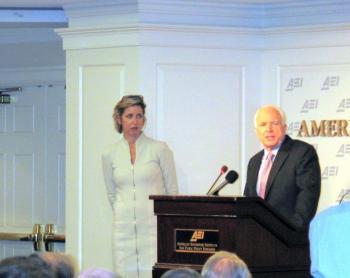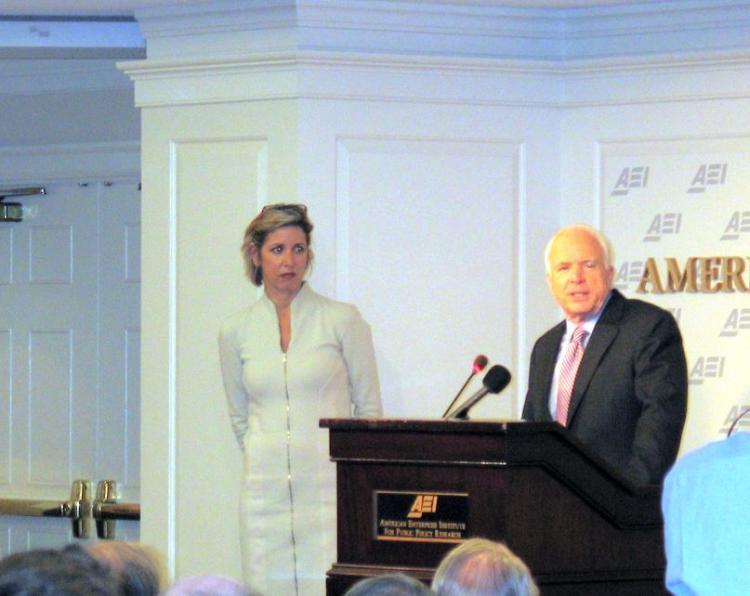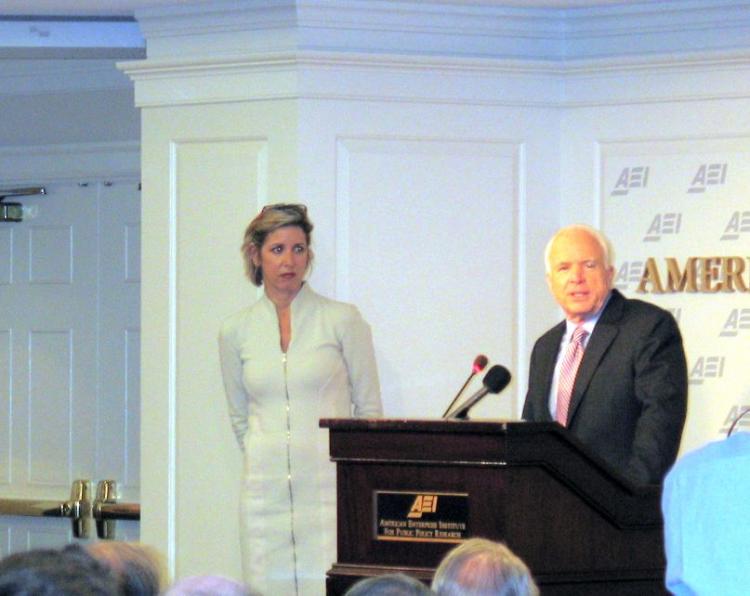WASHINGTON D.C.—Senator John McCain (R-Ariz.) outlined his recommendations to win the war in Afghanistan and called for President Obama to engage in open dialogue with the American public regarding the state of the war in Afghanistan during a policy address at the American Enterprise Institute for Public Policy Research in Washington, D.C. on Feb 25.
“Leaders in Europe and America must be clear with their publics about the nature of the effort in Afghanistan,” said Senator McCain to a packed room.
“We have tried to win this war without enough troops, without sufficient economic aid, without effective coordination and without a clear strategy. The ruinous consequences should come as no surprise. If we change our policies, the situation on the ground will change, too.”
Senator McCain stated that the situation in Afghanistan is nowhere near as dire as the situation in Iraq just two years ago, and that civilian fatalities at their peak in Iraq were ten times higher than civilian deaths at their peak in Afghanistan last year.
Senator McCain described a worsening situation and offered specific recommendations to win the war in Afghanistan, which include: the reapplication of the principles of counter insurgency utilized in Iraq, tailored for the circumstances in Afghanistan; an increase in Afghan troops to between 160, 000 to 200,000 from the current 68,000, and the establishment of an international trust fund to provide long term financing for the Afghan army.
While America will lead in the supply of troops in Afghanistan, McCain encouraged NATO allies and non-NATO allies to contribute to the efforts to strengthen the Afghan government and the rule of law, and encourage a crackdown on corruption and narcotics while supporting Afghan farmers.
McCain also suggested establishing regional strategies and increasing funding aimed to develop tribal and border areas.
The current Administration is now making an effort to improve the situation in Afghanistan. President Obama approved on Feb.17, the deployment of 17,000 additional U.S. soldiers and marines to Afghanistan, at the request of U.S. Defense Secretary Robert M. Gates. “This increase is necessary to stabilize a deteriorating situation in Afghanistan, which has not received the strategic attention, direction and resources it urgently requires,” said President Obama in statement released by the White House.
“Civilian fatalities in Afghanistan have increased dramatically as security has deteriorated, particularly in the southern provinces of the country. Since 2005, violence has increased over 500 percent, and despite the presence of tens of thousands of coalition troops, growing portions of the country suffer under the influence of the Taliban,” said McCain.
The percentage of Afghans rating their security positively has declined from 77 percent in 2005 to 40 percent today. Only one third of Afghans say that U.S. and NATO forces have a strong presence in their areas, down from 57 percent just two years ago, and Afghans cite the lack of security and corruption as the foremost reason their country is moving in the wrong direction” McCain continued.
Defense Secretary Gates has also described a deteriorating situation in Afghanistan. “The Taliban in Afghanistan will resort to more terror killings because they have been unsuccessful against NATO and U.S. troops in direct combat,” said Gates, Feb 24, on his trip to Australia, according to the Department of Defense website.
“What we are likely to see is more use of terror – killings of school teachers, local officials, things like that, the use of [improvised explosive devices] to try to sap the will of coalition partners as well as the Afghans and to bring discredit to the Afghan government because of its seemly inability to bring security to the rural areas,” added Gates at a roundtable discussion with U.S. and Australian reporters.
“As Americans, we must accept the responsibilities history has assigned us, and the interests require. We must do the hard work, as we always have, of building a stable and prosperous world order where an ever increasing number of human beings can flourish in peace, security and opportunity. This war will take time and commitment, and will not be easy,” said Senator McCain.
“Leaders in Europe and America must be clear with their publics about the nature of the effort in Afghanistan,” said Senator McCain to a packed room.
“We have tried to win this war without enough troops, without sufficient economic aid, without effective coordination and without a clear strategy. The ruinous consequences should come as no surprise. If we change our policies, the situation on the ground will change, too.”
Senator McCain stated that the situation in Afghanistan is nowhere near as dire as the situation in Iraq just two years ago, and that civilian fatalities at their peak in Iraq were ten times higher than civilian deaths at their peak in Afghanistan last year.
Senator McCain described a worsening situation and offered specific recommendations to win the war in Afghanistan, which include: the reapplication of the principles of counter insurgency utilized in Iraq, tailored for the circumstances in Afghanistan; an increase in Afghan troops to between 160, 000 to 200,000 from the current 68,000, and the establishment of an international trust fund to provide long term financing for the Afghan army.
While America will lead in the supply of troops in Afghanistan, McCain encouraged NATO allies and non-NATO allies to contribute to the efforts to strengthen the Afghan government and the rule of law, and encourage a crackdown on corruption and narcotics while supporting Afghan farmers.
McCain also suggested establishing regional strategies and increasing funding aimed to develop tribal and border areas.
The current Administration is now making an effort to improve the situation in Afghanistan. President Obama approved on Feb.17, the deployment of 17,000 additional U.S. soldiers and marines to Afghanistan, at the request of U.S. Defense Secretary Robert M. Gates. “This increase is necessary to stabilize a deteriorating situation in Afghanistan, which has not received the strategic attention, direction and resources it urgently requires,” said President Obama in statement released by the White House.
“Civilian fatalities in Afghanistan have increased dramatically as security has deteriorated, particularly in the southern provinces of the country. Since 2005, violence has increased over 500 percent, and despite the presence of tens of thousands of coalition troops, growing portions of the country suffer under the influence of the Taliban,” said McCain.
The percentage of Afghans rating their security positively has declined from 77 percent in 2005 to 40 percent today. Only one third of Afghans say that U.S. and NATO forces have a strong presence in their areas, down from 57 percent just two years ago, and Afghans cite the lack of security and corruption as the foremost reason their country is moving in the wrong direction” McCain continued.
Defense Secretary Gates has also described a deteriorating situation in Afghanistan. “The Taliban in Afghanistan will resort to more terror killings because they have been unsuccessful against NATO and U.S. troops in direct combat,” said Gates, Feb 24, on his trip to Australia, according to the Department of Defense website.
“What we are likely to see is more use of terror – killings of school teachers, local officials, things like that, the use of [improvised explosive devices] to try to sap the will of coalition partners as well as the Afghans and to bring discredit to the Afghan government because of its seemly inability to bring security to the rural areas,” added Gates at a roundtable discussion with U.S. and Australian reporters.
“As Americans, we must accept the responsibilities history has assigned us, and the interests require. We must do the hard work, as we always have, of building a stable and prosperous world order where an ever increasing number of human beings can flourish in peace, security and opportunity. This war will take time and commitment, and will not be easy,” said Senator McCain.




